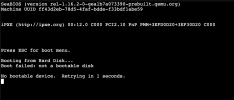Hi all,
I've been trying to deploy machines via the Proxmox VE API by cloning an existing template and configuring it with cloud-init.
Sometimes this works, however most times my VMs either get stuck in a bootloop or get stuck in initramfs:
Bootloop:

Initramfs:
ALERT! UUID=<UUID> does not exist. Dropping to a shell.
(initramfs)
My environment:
- Proxmox Virtual Environment 8.1.4 (Also tested on 8.0.x)
- Kernel Version: Linux 6.5.13-1-pve (2024-02-05T13:50Z)
- Template specs: 1 vCPU | 1 GB RAM | 3.5 GB bootdisk size
Machines are cloned from a template created using the cloud-init official image from ubuntu and the following steps are followed to create this template:
Machines are then cloned via the Proxmox VE API which include the following parameters:
- ciuser
- ipconfig0
- nameserver
- cipassword
Example cloned machine config:
Template config:
Am I missing something obvious here? I've been having this issue for the past 3 months.
I've been trying to deploy machines via the Proxmox VE API by cloning an existing template and configuring it with cloud-init.
Sometimes this works, however most times my VMs either get stuck in a bootloop or get stuck in initramfs:
Bootloop:

Initramfs:
ALERT! UUID=<UUID> does not exist. Dropping to a shell.
(initramfs)
My environment:
- Proxmox Virtual Environment 8.1.4 (Also tested on 8.0.x)
- Kernel Version: Linux 6.5.13-1-pve (2024-02-05T13:50Z)
- Template specs: 1 vCPU | 1 GB RAM | 3.5 GB bootdisk size
Machines are cloned from a template created using the cloud-init official image from ubuntu and the following steps are followed to create this template:
Code:
qm create <VMID> --memory 1024 --net0 virtio,bridge=vmbr0 --scsihw virtio-scsi-pci --onboot=1 --ostype l26
qm set <VMID> --scsi0 <STORAGE>:0,import-from=<PATH-TO-IMG>
qm set <VMID> --ide2 <STORAGE>:cloudinit
qm set <VMID> --boot order=scsi0
qm set <VMID> --serial0 socket --vga serial0
qm set <VMID> --cicustom "vendor=local:snippets/ubuntu-22.04-vendor.yaml"
qm template <VMID>Machines are then cloned via the Proxmox VE API which include the following parameters:
- ciuser
- ipconfig0
- nameserver
- cipassword
Example cloned machine config:
Code:
boot: order=scsi0
cicustom: vendor=local:snippets/ubuntu-22.04-vendor.yaml
cipassword: **********
ciuser: blingbling
description: Post cloud init scripts found here%3A /var/lib/vz/snippets%0A%0AVM Configs found here%3A /etc/pve/qemu-server
ide2: vms-vhds:vm-1144-cloudinit,media=cdrom,size=4M
ipconfig0: gw=10.251.0.1,ip=10.251.192.91/16
memory: 1024
meta: creation-qemu=8.0.2,ctime=1702576222
name: S-hascicustom
nameserver: 1.1.1.1 8.8.8.8
net0: virtio=BC:24:11:4C:07:6C,bridge=vmbr0
onboot: 1
ostype: l26
scsi0: vms-vhds:vm-1144-disk-0,size=3584M
scsihw: virtio-scsi-pci
serial0: socket
smbios1: uuid=2a5a7016-9519-40d3-8c93-fe5008458f69
vga: serial0
vmgenid: b617bbc1-c8ee-4094-934f-e960a98b541bTemplate config:
Code:
boot: order=scsi0
cicustom: vendor=local:snippets/ubuntu-22.04-vendor.yaml
description: Post cloud init scripts found here%3A /var/lib/vz/snippets%0A%0AVM Configs found here%3A /etc/pve/qemu-server
ide2: vms-vhds:vm-100-cloudinit,media=cdrom
memory: 1024
meta: creation-qemu=8.0.2,ctime=1702576222
net0: virtio=A2:9C:B0:50:9F:CD,bridge=vmbr0
onboot: 1
ostype: l26
scsi0: vms-vhds:base-100-disk-0,size=3584M
scsihw: virtio-scsi-pci
serial0: socket
smbios1: uuid=068f9ff0-3196-4e37-9b87-0b52572881e2
template: 1
vga: serial0
vmgenid: af7c5060-f4c8-42b5-a8ed-f42de8e52d98
Last edited:

